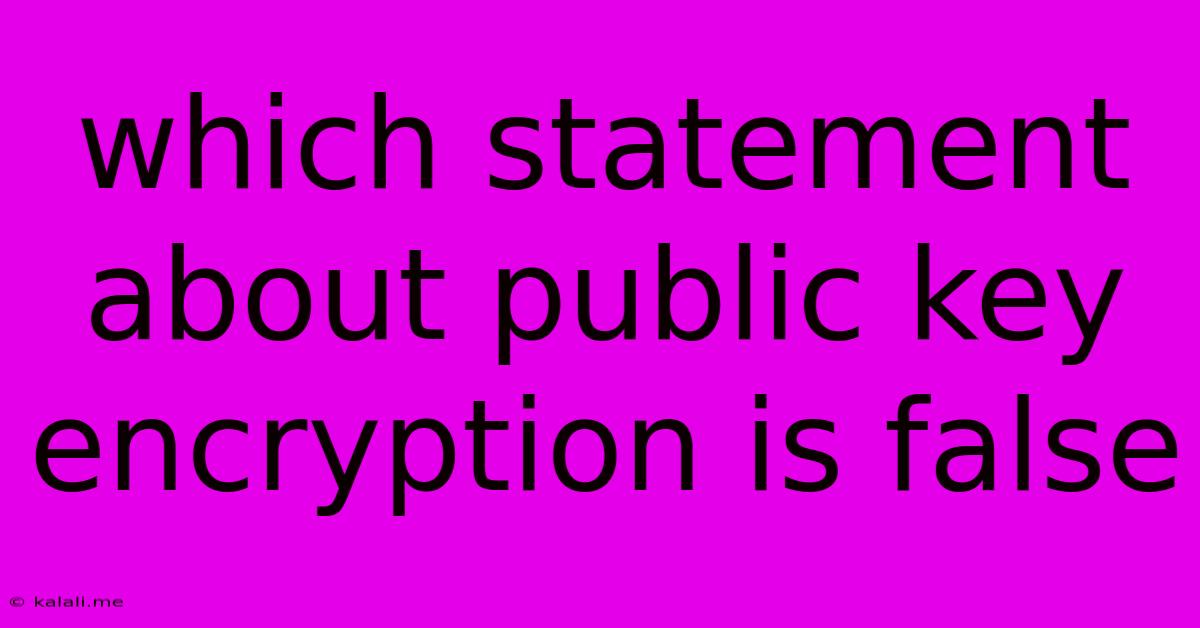Which Statement About Public Key Encryption Is False
Kalali
Jun 14, 2025 · 3 min read

Table of Contents
Which Statement About Public Key Encryption Is False? Debunking Common Misconceptions
Public key encryption, also known as asymmetric encryption, is a cornerstone of modern cybersecurity. Its reliance on a pair of keys – a public key for encryption and a private key for decryption – makes it a powerful tool for secure communication and data protection. However, understanding its nuances can be tricky, leading to several common misconceptions. This article will explore some frequently made statements about public key encryption and identify the false one(s). We'll also delve into the underlying principles to solidify your understanding of this crucial cryptographic method.
Understanding the Basics of Public Key Encryption: Before we dive into the false statements, let's briefly recap how public key encryption works. Each user possesses a unique pair of keys: a public key, which can be freely shared, and a private key, which must be kept secret. Messages encrypted with the public key can only be decrypted using the corresponding private key. This asymmetric nature is what distinguishes it from symmetric encryption, which uses the same key for both encryption and decryption.
Now, let's examine some common statements and pinpoint the inaccuracies:
Common Statements About Public Key Encryption and Their Accuracy:
1. Public key encryption is significantly faster than symmetric encryption.
FALSE. Public key cryptography algorithms are computationally more intensive than symmetric algorithms. Symmetric encryption, using a single shared secret key, is generally much faster for encrypting large amounts of data. Public key encryption is often used to exchange the symmetric key securely, after which faster symmetric encryption takes over for the bulk of the data transfer.
2. The public key can be used to decrypt a message.
FALSE. This is a fundamental misunderstanding of public key cryptography. The public key is only used for encryption. Only the corresponding private key can decrypt the message.
3. Public key encryption guarantees perfect secrecy.
FALSE. While public key encryption offers a high level of security, it doesn't guarantee perfect secrecy. The strength of the encryption depends on the algorithm used and the length of the key. Advances in computing power and the development of new cryptanalytic techniques could potentially compromise the security of even the strongest public key systems. Furthermore, vulnerabilities in implementation or key management can also weaken the security.
4. Public key encryption is used for digital signatures.
TRUE. This is a crucial application of public key cryptography. Digital signatures use the private key to create a signature that can be verified using the corresponding public key, ensuring authenticity and non-repudiation.
5. Anyone can generate a public-private key pair.
TRUE. The generation of these key pairs is typically a straightforward process using cryptographic libraries and software.
Conclusion: Addressing the Falsehoods
We've explored several common statements about public key encryption, highlighting the false ones. It's crucial to remember that while public key encryption is a powerful tool, it's not a silver bullet. Its security depends on proper implementation, strong key management practices, and the ongoing evolution of cryptographic algorithms to stay ahead of potential threats. Understanding these nuances is vital for anyone working with or relying on this important technology for secure communication and data protection. Remember that the core principle remains: the public key encrypts, the private key decrypts – never the other way around.
Latest Posts
Latest Posts
-
Whats The Square Root Of 288
Jun 15, 2025
-
Population Of Scheduled Caste In India
Jun 15, 2025
-
Which Of The Following Materials Is Considered A Conductor
Jun 15, 2025
-
How Do The Bhaktis And Sufis Compare
Jun 15, 2025
-
Which Of The Following Statements About Computer Networks Is True
Jun 15, 2025
Related Post
Thank you for visiting our website which covers about Which Statement About Public Key Encryption Is False . We hope the information provided has been useful to you. Feel free to contact us if you have any questions or need further assistance. See you next time and don't miss to bookmark.